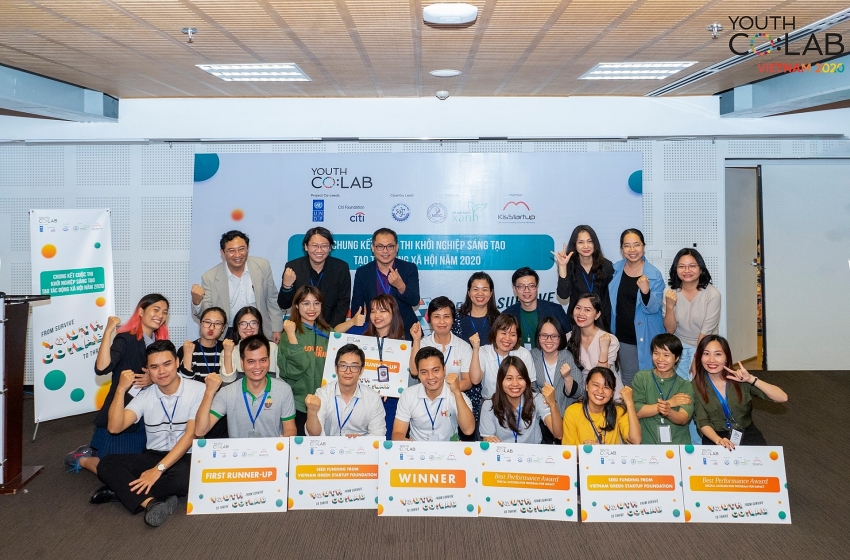Third Youth Co:Lab Summit highlights resilience amid COVID-19 pandemic
 |
| The third Youth Co:Lab Regional Summit brought together several thousand participants from 120 countries and territories |
Ending on June 4, the three-day virtual event brought together over 4,700 young social entrepreneurs, incubators, accelerators, investors, and governments across 120 countries and territories, to turn sustainable development ideas into viable business models.
The Summit also saw the release of a research report conducted by Youth Co:Lab titled “One Year On: How Young Entrepreneurs in Asia-Pacific Responded to COVID-19”. The report discloses how the pandemic has challenged youth-led enterprises in Asia and the Pacific on multiple fronts.
The survey shows that 92 per cent have been negatively impacted by COVID-19, with 85 per cent shrinking their businesses or limiting their growth to survive.
| The agility and resilience of youth-led enterprises is evident as 87 per cent changed and adapted their business strategy in response to the pandemic. |
Despite this, the agility and resilience of youth-led enterprises is evident as 87 per cent changed and adapted their business strategy in response to the pandemic. A majority 86 per cent have innovated to develop new products and services while transforming their operating models.
The Asia-Pacific is home to 55 per cent of the world’s young people, or 660 million youth between the ages of 15 to 24. This segment accounts for almost half of the region's unemployed. The COVID-19 pandemic and resulting economic turmoil have exacerbated the segment’s unemployment crisis. At the same time, young people are also leading the response to the crisis through volunteering, social innovation, and activism.
“COVID-19 recovery strategies must incorporate measures to tackle the worsening youth unemployment crisis. Social entrepreneurship offers a route for young people to create jobs, tackle challenges faced by their communities, and drive inclusive growth and sustainable development,” said Peter Babej, CEO of Citi Asia-Pacific. “Citi and the Citi Foundation are committed to working with all partners to help young people develop their own solutions to the biggest social problems impacting their communities, and meet the UN Sustainable Development Goals.”
Over the last four years, Youth Co:Lab programmes have been implementing in 25 countries and territories across the region, with national dialogues, regional summits, and social innovation challenges reaching over 75,000 participants. The initiative has benefitted over 8,000 young social entrepreneurs and helped launch or improve over 1,000 social enterprises.
In Vietnam, 29 startups received financial and technical support through the SDG Innovation Incubation Programme to further innovation with AI and other 4.0 technologies.
420 youths joined sub-national and national policy dialogues at local and central level to advocate for social impact business and youth innovations and entrepreneurship. Vietnam was also chosen to host the second Youth Co:Lab Asia-Pacific Summit 2019 in Hanoi with the participation of 500 delegates from 20 countries.
Youth Co:Lab has also established partnerships with 192 key ecosystem players to strengthen the Youth Empowerment Alliance. The aim is to support young entrepreneurs, particularly women and marginalised youth, by connecting them with businesses, incubators, accelerators, and financing options, to develop their ideas into viable business models for sustainable social impact.
What the stars mean:
★ Poor ★ ★ Promising ★★★ Good ★★★★ Very good ★★★★★ Exceptional
Themes: Together We Win
- Greater Mekong Subregion executives to discuss sustainable tourism
- TCPVN donates 1,200 medicine bags to COVID-19 patients in southwest
- AB InBev supports orphans with scholarships amid COVID-19
- Evaluating the reach of support in turbulent times
- Gamuda Land grants “Back to School” scholarships to support disadvantaged students
Related Contents
Latest News
More News
- Businesses bouncing back after turbulent year (February 27, 2026 | 16:42)
- PM outlines new tasks for healthcare sector (February 25, 2026 | 16:00)
- Ho Chi Minh City launches plan for innovation and digital transformation (February 25, 2026 | 09:00)
- Vietnam sets ambitious dairy growth targets (February 24, 2026 | 18:00)
- Masan Consumer names new deputy CEO to drive foods and beverages growth (February 23, 2026 | 20:52)
- Myriad risks ahead, but ones Vietnam can confront (February 20, 2026 | 15:02)
- Vietnam making the leap into AI and semiconductors (February 20, 2026 | 09:37)
- Funding must be activated for semiconductor success (February 20, 2026 | 09:20)
- Resilience as new benchmark for smarter infrastructure (February 19, 2026 | 20:35)
- A golden time to shine within ASEAN (February 19, 2026 | 20:22)

 Tag:
Tag:

























 Mobile Version
Mobile Version